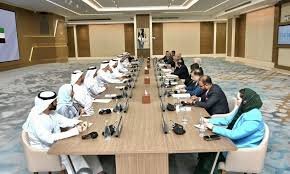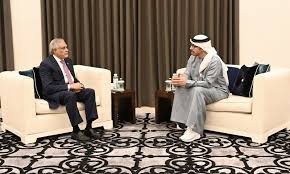In a world where diplomacy often moves at a cautious pace, a refreshing and long-awaited breakthrough has just unfolded between Pakistan and the United Arab Emirates (UAE). After a significant gap of 13 years, the 12th Joint Ministerial Commission (JMC) session between the two nations finally convened — and it didn’t disappoint. The major highlight of this session was the signing of a crucial Memorandum of Understanding (MoU) for visa exemption for diplomatic passport holders, signaling a new era of cooperation, goodwill, and renewed trust between these two historically connected countries.
This is more than just a bureaucratic agreement; it’s a symbol of evolving relations and mutual commitment to opening doors and strengthening regional bonds.
A New Chapter in Pakistan-UAE Relations
The 12th JMC session wasn’t just an ordinary sit-down between officials. It was a statement of intent. The meeting marked a crucial turning point in bilateral ties, highlighting the willingness of both nations to address gaps in communication and re-energize diplomatic, trade, and people-to-people relations.

For over a decade, the Joint Ministerial Commission — a critical platform for collaborative decision-making — remained inactive. The revival of this important forum after 13 long years is an indication of the changing geopolitical dynamics and the growing need for countries like Pakistan and the UAE to realign their partnerships in a rapidly shifting regional landscape.
The MoU signed on visa exemption for holders of diplomatic passports may seem like a technical agreement to some, but its implications run much deeper. It serves as a strong message of trust, removing barriers for top-level policymakers and paving the way for faster, more effective diplomatic engagement.

Why This Deal Matters Right Now
Both Pakistan and the UAE have historically shared strong ties, rooted in cultural connections, economic partnerships, and mutual interests in regional stability. Millions of Pakistani expatriates live and work in the UAE, contributing actively to the Emirati economy while supporting families back home through remittances.
Yet, in recent years, certain diplomatic engagements had slowed down. Trade figures had started to stagnate, and mutual visits by key officials became rare. The absence of regular JMC sessions was a glaring gap in what was once a model regional partnership.
In that context, the signing of the MoU isn’t just a resumption of old habits — it represents a reinvention of bilateral priorities. Both countries now recognize the importance of breaking bureaucratic barriers and fostering easy, regular diplomatic exchanges. The ease of movement for officials can directly lead to better coordination in business, education, defense, technology, and cultural sectors.
This isn’t a small step — it’s a gateway to bigger, bolder collaborations.

A Moment of Warmth and Optimism
The atmosphere at the 12th JMC session was notably warm and optimistic. Delegates from both nations expressed satisfaction at the pace of discussions and the outcomes achieved. Beyond the visa exemption agreement, talks reportedly touched on enhancing trade, increasing investment opportunities, strengthening energy partnerships, and boosting cooperation in emerging industries like fintech, tourism, healthcare, and renewable energy.
The symbolism of the gathering was equally important. It sent a reassuring message to the Pakistani community in the UAE and to Emirati investors eyeing opportunities in Pakistan. It signaled a mutual readiness to move beyond past delays and focus on building a relationship centered on trust, mutual growth, and regional prosperity.
The Untapped Potential of Pakistan-UAE Relations
While both countries have long enjoyed cordial relations, experts and observers agree there’s a vast, untapped potential that’s yet to be explored.
Pakistan offers a large, youthful population, a growing middle class, strategic access to Central Asia, and a rapidly modernizing infrastructure network. The UAE, on the other hand, stands as a global business hub, with its economy increasingly looking to diversify beyond oil through investments in technology, logistics, green energy, and tourism.
The revival of the JMC and the visa exemption agreement are crucial first steps in unlocking this potential. Improved diplomatic access will facilitate more frequent discussions on trade liberalization, business ventures, and joint infrastructure projects. It could also lead to increased educational exchanges, medical collaborations, and tourism initiatives that benefit citizens on both sides.
What Comes Next?
With the signing of this MoU, all eyes are now on the practical outcomes. Will this agreement trigger an increase in high-level visits and new business deals? Will it pave the way for similar exemptions for other categories of travelers, perhaps even regular citizens in the future?
The immediate impact will be seen in how swiftly both countries can follow up on other pending agreements and proposals discussed during the JMC. Several sectors were reportedly highlighted for priority action, including:
- Energy partnerships, particularly in renewables and sustainable energy projects.
- Trade and investment incentives to encourage joint ventures.
- Education and cultural exchanges to build stronger people-to-people ties.
- Tourism collaborations with an eye on promoting religious tourism and adventure tourism in Pakistan.
- Health and fintech partnerships, capitalizing on the UAE’s advanced healthcare infrastructure and growing digital finance sector.
If these areas receive the attention they deserve, the 12th JMC session could be remembered as a milestone that redefined Pakistan-UAE relations for the modern era.

A Message of Regional Stability and Collaboration
In a region often marred by political tensions and economic uncertainty, such positive developments offer a welcome narrative of cooperation and mutual growth. The Pakistan-UAE partnership has the potential to become a model for how countries with shared histories can evolve their ties to meet modern challenges.
By focusing on practical diplomacy, easing travel restrictions for key personnel, and actively engaging in collaborative projects, both nations can contribute to regional peace, economic development, and cultural harmony.
This MoU is a small but crucial stitch in a much larger tapestry of regional diplomacy. It reminds us that even after years of pause, meaningful progress is possible when nations decide to prioritize dialogue and partnership over indifference.
Final Thoughts
Diplomacy may sometimes be a slow-moving process, but agreements like the one signed at the 12th JMC session show that it’s never too late to renew old friendships and build new avenues of cooperation. The visa exemption MoU for diplomatic passport holders is more than a formal agreement; it’s a declaration of trust, intent, and shared vision.
As Pakistan and the UAE move forward from this significant development, the hope is that this momentum will inspire other long-pending initiatives and bring tangible benefits not just to officials, but to the millions of ordinary citizens whose lives are shaped by the decisions made in these meeting rooms.
For both nations, this could mark the beginning of a revitalized partnership rooted in mutual respect, opportunity, and an optimistic outlook for the future.
Do follow UAE Stories on Instagram
Israel-Iran War: Saudi Arabia, UAE Wanted THIS Nation to Win… Shocking Details Revealed














